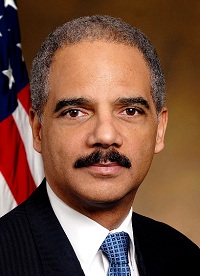Our best hope to get judicial corruption and government corruption addressed is with our local grand juries.
But if your efforts get illegally blocked with your county or state grand juries, realize that the federal government is OBLIGATED BY STATUTE to allow your charges to be presented to a federal grand jury.
Attorney General Eric Holder’s staff has a specific legal obligation. They may violate this law, too, but I personally will take every available option to get these crooks in prison….
18 U.S.C. 3332 provides:
(a) It shall be the duty of each such grand jury impaneled within any judicial district to inquire into offenses against the criminal laws of the United States alleged to have been committed within that district. Such alleged offenses may be brought to the attention of the grand jury by the court or by any attorney appearing on behalf of the United States for the presentation of evidence. Any such attorney receiving information concerning such an alleged offense from any other person shall, if requested by such other person, inform the grand jury of such alleged offense, the identity of such other person, and such attorney’s action or recommendation. [emphasis added.]
This means that it is the OBLIGATION of a U.S. Attorney or Assistant U.S. Attorney to present your charges to a federal grand jury if you so request.
Here’s what I have done.
First, I have compiled proof of significant criminal violations by judges of the United States District Court for the Northern District of Georgia, the United States Court of Appeals for the Eleventh Circuit, federal judicial employees, U.S. Attorney Sally Quillian Yates, employees of the U.S. Attorney’s office, Fulton County District Attorney Paul Howard, Jr., employees of the Fulton County District Attorney’s Office, Fulton County Grand Jury Foreman Steve Broadbent, employees of the Fulton County Sheriff’s Department, and some judges and judicial employees in the Fulton County Superior Court.
Second, I asked employees of the U.S. Attorney’s Office to meet and consider the evidence, and they refused or ignored the requests. I sent the letters by fax and obtained fax confirmation pages to prove delivery.
After my initial letters, I sent letters expressing that the U.S. Attorney and Assistant U.S. Attorneys were violating several criminal statutes in failing to act, including 18 U.S.C. 1603 (Obstruction of Justice), 18 U.S.C. 4 (Misprision of Felonies), and others. I felt it was very important to put the U.S. Attorney’s Office on notice because this sets me up to try to eliminate their involvement with the grand jury.
Third, I asked the U.S. Attorney and other attorney employees of the U.S. Attorney’s Office to inform the Grand Jury of my charges and evidence, and the request was ignored. I made several such requests, and the last one cited 18 U.S.C. 3332. I sent the letters by fax, and I obtained confirmation pages. I asked that a U.S. Attorney from a state in a different federal circuit handle the matter since I said my charges will include charges against the U.S. Attorney in Atlanta and her staff. This is important because the U.S. Attorney can blow your charges out of the water with the grand jury. A neutral U.S. Attorney is the best shot at the slight chance of justice. (Another circuit is important because every U.S. Attorney within the states covered by the local federal circuit will have to appear before the judges that I am seeking to get indicted. The local U.S. Attorney’s Office will also be defending these same judges.)
Maybe you’ll get lucky and get to present your information to be passed to the grand jury. If so, you want to have short, specific charges with clear pieces of evidence.
Fourth, Under 28 U.S.C. 1361, otherwise known as The Mandamus Act, the district court has original jurisdiction over a mandamus action “to compel an officer or employee of the United States or any agency thereof to perform a duty owed to the plaintiff. Mandamus relief is only appropriate when: (1) the plaintiff has a clear right to the relief requested; (2) the defendant has a clear duty to act; and (3) “no other adequate remedy [is] available.” Id. Put another way, a writ of mandamus “is intended to provide a remedy for a plaintiff only if he has exhausted all other avenues of relief and only if the defendant owes him a clear non-discretionary duty.” Heckler v. Ringer, 466 U.S. 602, 616 (1984).
Since I have a clear right to have any criminal charges presented to a federal grand jury; since the U.S. Attorney has a clear duty to act; and since I have no other adequate remedy as there is no way to reach a federal grand jury except through the U.S. Attorney’s Office, mandamus is proper.
File a simple civil action asking the court to compel a U.S. Attorney to present the charges to the federal Grand Jury as required by 18 U.S.C. § 3332 or the Federal Grand Jury Handbook, or the many case law citations. In my case, I have been banned from ever filing another lawsuit anywhere in America for the rest of my life, so I will need the U.S. Supreme Court to declare that order void before I can pursue legal action. But, virtually every other American has this right.
FYI: Folks, I have been sick this week, so I haven’t written much, and I haven’t taken calls or played back voice mail. It’s just a little flu or cold or some such thing, so I’ll be fine soon.
Previous Articles
Previous Grand Jury Article — February 23, 2011
Previous Grand Jury Article — April 23, 2011
Previous Grand Jury Article — May 3, 2011
Previous Grand Jury Article — August 25, 2011
Previous Grand Jury Article — September 4, 2011
If It’s Not a Runaway, It’s Not a Real Grand Jury
On Grand Juries from the Corpus Juris Secundum
I am not an attorney. I cannot give legal advice. Please make your own determinations or seek legal advice should you know an honest attorney.
Disclaimer
This manual is intended purely as a communication of information in accordance with the right of free speech. It does not constitute either general or specific legal advice. Anyone seeking legal advice should consult a competent professional. Neither the author, editor, or publisher guarantee that using this information will result in success or protect the reader from harm. The reader must accept that risk, and thoroughly study the law before using any of this material. Readers must take full responsibility for the consequences of any actions taken based on the contents of this manual.
{jcomments on}






